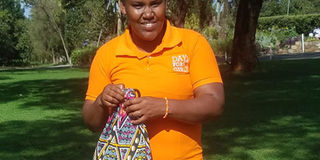Ending menstruation poverty with reusable pads

Anita Cherono is the founder of Bomet Days for Girls Enterprise. She poses here with the sanitary kit. PHOTO| COURTESY
What you need to know:
- Since its inception, the enterprise has managed to reach out to over 11,000 girls and boys who have been trained on menstrual health management.
- Bomet Days for Girls enterprise has distributed over 7,800 reusable washable hygiene kits to women and girls across Kenya and helps restored their dignity and keep girls in school.
Like many of her peers, Anita Cherono was unprepared for her monthly period. Furthermore, it was a taboo topic and she had nobody to turn to for help.
This is what motivated the 30-year-old to dedicate her life to ending period shame and poverty. The mother of one provides reusable sanitary pads to vulnerable girls.
She is the founder of Bomet Days for Girls Enterprise. She was trained and certified to be an Ambassador on Women Health in 2017 by Days for Girls International based in Washington DC.
Anita established her own enterprise in Bomet after sending two experienced tailors to attend a training in Days for Girls Kampala University on how to make the reusable sanitary hygiene pads.
Since its inception, the enterprise has managed to reach out to over 11,000 girls and boys who have been trained on menstrual health management.
Bomet Days for Girls enterprise has distributed over 7,800 reusable washable hygiene kits to women and girls across Kenya and helps restored their dignity and keep girls in school.
INCREASED ACCESS TO MENSTRUAL CARE
“Days for Girls increases access to menstrual care and education by developing innovative sustainable solutions, by making reusable washable sanitary pads that last for three years and helps shatter stigmas and limitations for women and girls,” she says.
Anita relies on her social network of friends and different organisations that have come in to support. She travels to the United States at least once a year to fundraise for sanitary pads campaign.
"In Kenya, we currently have over 15 registered Days for Girls Enterprises across different counties.”
The sanitary kit includes a transport bag, two pairs of underwear, soap and washcloth, two shields made from two pieces of cotton (with moisture-barrier fabric between to prevent leaks), and wings that fold around the underwear.
"Our shields are made of beautiful, printed fabrics for comfort and to hide stains. They have two pockets on either side of the shield that hold our liners in place. The pockets are deep enough for double or triple liners when she has a heavy flow.”

The sanitary kit includes a transport bag, two pairs of underwear, soap and washcloth, two shields made from two pieces of cotton (with moisture-barrier fabric between to prevent leaks), and wings that fold around the underwear. PHOTO| COURTESY
Also in the kit there are eight liners that go in the shields and act as the pad. The liners look like washcloths so girls can wash and hang them out to dry without any embarrassment. They are made from 100 per cent cotton flannel so they’re washable with very little water and quick to dry in the sun.
After graduating from university, Anita started visiting schools during her free time to talk to girls and boys about menstruation and puberty. Her home became a safe haven for girls who would go to request for sanitary supplies every time the schools open.
This ignited in her the passion to want to break period silence and share about Menstruation to everybody who could listen.
Days for Girls organisation is currently working on a RED LINE Campaign across the Country , geared to drawing eradicate menstrual shaming. No more lost days. No more lost lives. No more shame. No more lost dignity due to the unmet needs of a basic natural function that connects us all.
“Period poverty is the lack of access to sanitary products, menstrual hygiene education, toilets and hand washing facilities. My aim apart from helping girls stay in school and be comfortable during their menses is to also demystifying menstrual stigma.”
She also thinks that sanitary pads should be given out for free in all public toilets just as the fight for free condoms is easily accessible in public toilets.



